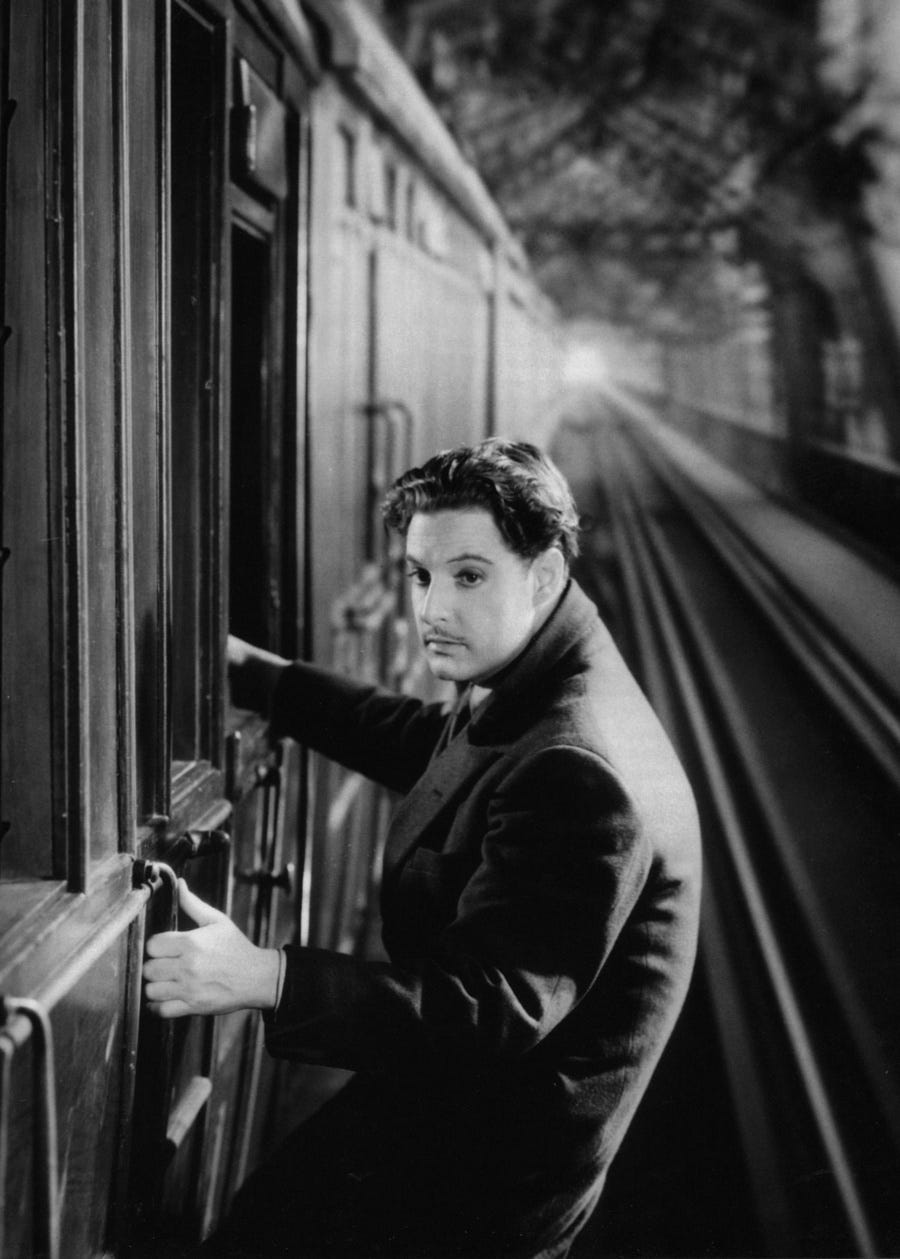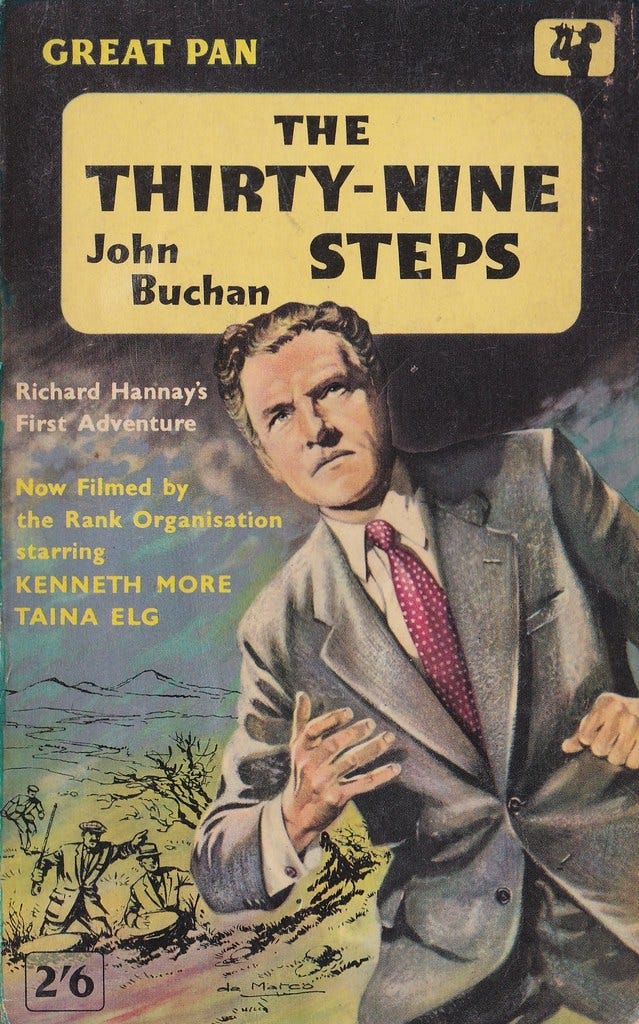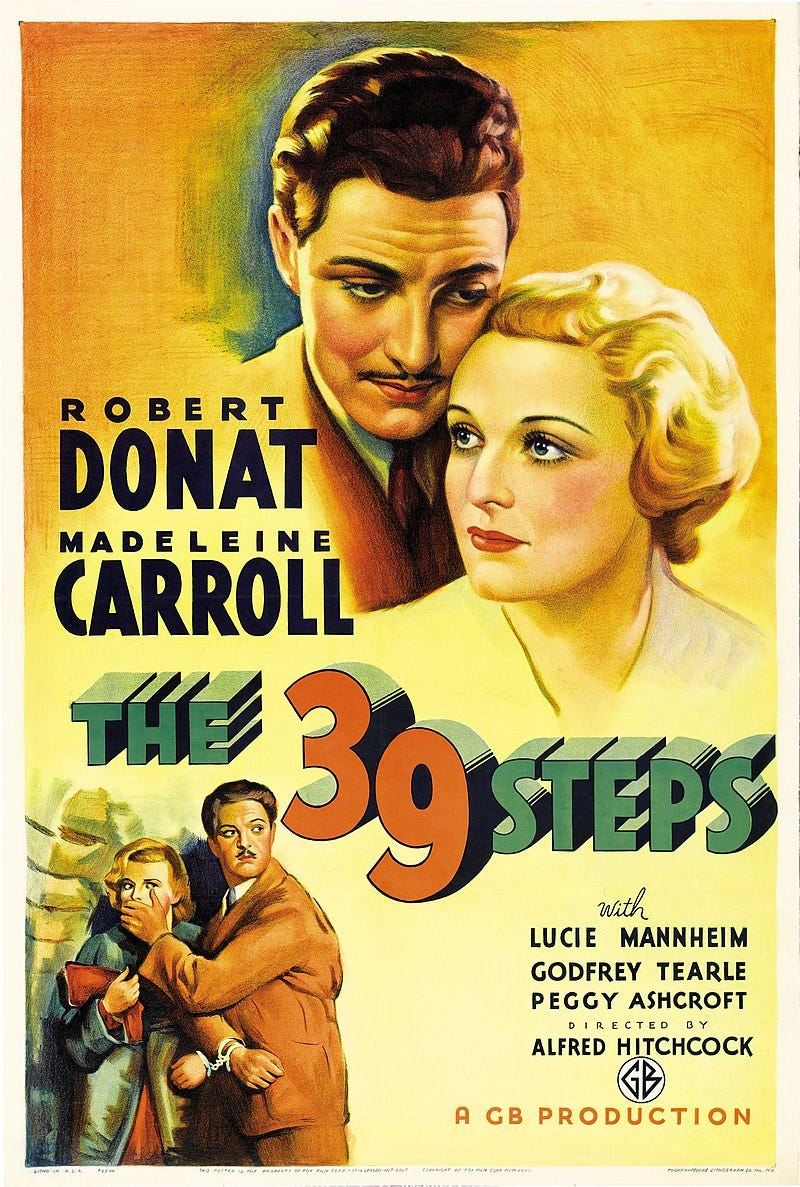The 39 Steps (1935)
"There are twenty million women in this island and I've got to be chained to you..."
This Friday on WEEKEND FLICKS. Cinema for Grown Ups: A tin of soup and an old DVD — finding solace in Hitchcock’s The 39 Steps (1935):
I’ve just spent the last few days supervising house clearance at my mother’s cottage in South Oxfordshire. House clearance is, frankly, difficult. The detritus of family life. Gone. Sorted, sifted, packed and disposed of in a clinical fashion. All those memories! That silly little butter dish, stainless steel with wooden handles, worn in the dishwasher many thousands of times. Worth sod all and of no practical use, as you have a perfectly good one back at home. But it was part of your existence, when you were five. Placed on the checked kitchen table, directly in front of you. Day in and day out. Home from school with a bottle of milk. Christmas, Easter — birthday parties with candles and a cake. The time naughty Luke — tee hee — squashed nasty little black flies of gossamer plastic (a joke from the local toy shop, bought in a garish, colourful packet) into the butter kept in the ‘fridge, which my horrified mother then had to return to the long-suffering Express Dairies. And into the skip, it goes. To be crushed for scrap. “Not worth anything, Guv. No demand.”
On the final night, left with a bed, a blanket and a lonely tin of Oxtail soup in an otherwise empty house, there was at least, on the Sitting Room carpet, a Panasonic television monitor and a small DVD player: a useful solace for a time like this, and sifting through a discarded pile of old DVDs (freebies from The Sunday Telegraph), I came across The 39 Steps (1935), the original Hitchcock version. Perfect fodder for a difficult time. Escapism with a capital ‘E’. Robert Towne (the screenwriter and director) said:
It’s not much of an exaggeration to say that all contemporary escapist entertainment begins with The 39 Steps.
And Orson Welles — no less — described it as a masterpiece. In any event, the BFI ranks The 39 Steps as the ‘fourth-best film of the 20th Century’, altho’ how it’s possible to rank films in numerical order is anyone’s guess.
There have been four major film adaptations of Buchan’s yarn. The Hitchcock version (1935), starring Robert Donat and Madeline Carroll; Ralph Thomas’s interpretation from 1959, starring Kenneth More; Don Sharp’s film from 1978, which we covered last year (that’s the one with Robert Powell dangling from the hands of Big Ben), and a more recent BBC television adaptation from 2008, starring Rupert Penry-Jones as Richard Hannay. Buchan’s original book, The Thirty-Nine Steps (note the spelling), is set in the early summer of 1914, altho’ the book wasn’t published until well into the war, in the autumn of 1915.
The Hitchcock version is the one everybody raves about, a classic of the suspense genre — and it is, of course, a terrific film, entirely visual — with a host of now familiar Hitchcockian elements: the innocent man on the run, the ice-cool leading lady (blonde), the ‘MacGuffin’ (i.e. the red herring that drives the plot), the dark humour and the director’s cameo appearance — although as a die-hard Buchan and Robert Powell fan, I must confess to a sneaky affection for the Don Sharp version of 1978, which returns the story to its pre-First World War original setting, and, apart from the ludicrous, if amusing, clock sequence nicked from Harold Lloyd and Will Hay, is probably the most faithful version when compared to the book. And there is, perhaps, far more to Buchan than at first meets the eye; an imaginative tour de force. In Mr. Standfast (1919), a personal favourite, Brigadier-General Richard Hannay DSO, CB, is recalled from the Western Front and sent to investigate a sinister model village in the Midlands, an Arts & Crafts experiment populated by lefties: writers, potters, conscientious objectors, and other dubious arty types in silk scarves and suede shoes. Similarly, in Greenmantle (1916), Hannay is sent to investigate an Islamic uprising in Constantinople, Imperial Germany’s ingenious plot to win the war by surreptitious and dastardly means.
Keep reading with a 7-day free trial
Subscribe to Luke Honey's WEEKEND FLICKS. to keep reading this post and get 7 days of free access to the full post archives.







